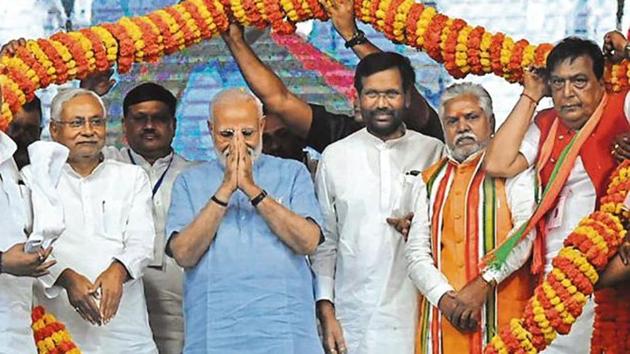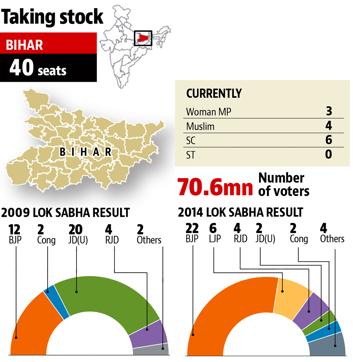Lok Sabha elections 2019: NDA looks for repeat of 2014 performance against Oppn alliance
The BJP and its allies, the Lok Janshakti Party (LJP) of Ram Vilas Paswan and Upendra Kushwaha’s Rashtriya Lok Samata Party (RLSP), won 31 out of 40 Lok Sabha seats in 2014.
The Patna headquarters of the Bharatiya Janata Party (BJP) is crowded with politicians preparing for booth-level meetings. In a newly inaugurated facility on the campus, young professionals work on laptops to churn out constituency-level data and tailor individual campaigns for the upcoming parliamentary elections.

“The party is stronger than what it was in 2014,” the party’s Bihar vice-president Devesh Kumar said. “We now have an active committee at every polling station. We are ready for the battle.”
The BJP and its allies, the Lok Janshakti Party (LJP) of Ram Vilas Paswan and Upendra Kushwaha’s Rashtriya Lok Samata Party (RLSP), won 31 out of 40 Lok Sabha seats in 2014. A year later, the BJP was dealt a humiliating defeat in the assembly elections by the Janata Dal (United)-Rashtriya Janata Dal (RJD)-Congress alliance.
Also Read | PM Modi defends government, record on jobs, growth
The JD(U) has since returned to the fold of the National Democratic Alliance (NDA), which appears formidable in the run-up to the upcoming parliamentary elections. But it faces a resurgent RJD, rising anti-incumbency against chief minister Nitish Kumar and a deteriorating law-and-order situation that mars its biggest campaign focus: governance.
The problems within the NDA began with a lack of internal cohesion. The RLSP walked out of the NDA after failing to agree on a seat-sharing plan in December.

The JD(U) ruffled the BJP’s feather with a police crackdown on workers of the Akhil Bharatiya Vidyarthi Parishad (ABVP) – the students’ unit of the Rashtriya Swayamsevak Sangh (RSS) –after a clash between supporters of the two parties during the Patna university students’ union election in December. “The police never raided ABVP office even during Lalu raaj,” a BJP leader said, requesting he not be identified.
BJP leaders blame Nitish Kumar’s trusted aide Prashant Kishor for this. Kishor, of late, appears to have taken a back seat in the JD(U) after a tug-of-war with the party’s general secretary RCP Singh and some off-the-cuff remarks that apparently did not go down well with Kumar.
Kumar has also strongly articulated his position on issues such as the Ram Temple (saying it is not on his agenda), opposed the citizenship amendment bill and the triple talaq bill espoused by the BJP, creating some discomfort for the saffron party.
BJP leaders privately complain about the deteriorating law and order situation under Kumar. A BJP delegation that went to meet the family of a murdered young businessman, Gunjan Khemka, had to face an angry mob in December in Vaishali. Kumar’s government also took a beating after the Muzaffarpur shelter home case, which involved minor girls who were found to have been sexually abused for years.
“He had an impressive track record on the law and order front. Today, that advantage seems to have gone”, a senior minister said.
Deputy chief minister Sushil Kumar Modi dismisses the charge of poor law and order. “Figures show crime has come down drastically in 2018,” he said. He cites figures – between 2004 and 2018 murder cases dropped from 3,861 to 2,522 and kidnapping for ransom from 411 to 36. “Unlike Lalu raaj, we do not interfere with investigation,” Modi said.
The BJP fielded candidates in 30 of 40 Lok Sabha seats in Bihar and won 22 in the previous election. This time it agreed to settle for 17 seats to accommodate the JD(U), which also got 17.
The new pact means the BJP settled for 13 fewer seats to contest and at least five of its sitting MPs were denied tickets.
The fissures have already started to show up. Former Purnea MP Uday Singh has quit the party. Patna Saheb MP Shatrughan Sinha and Darbhanga MP Kirti Azad are out of the BJP. “The NDA’s performance will depend on Kumar’s ability to draw support from three main constituencies – the extremely backward communities, the mahadalits and women,” said Shaibal Gupta of the Patna-based Asian Development Research Institute.
“It will be wrong to dismiss Nitish Kumar in Bihar,” said JD(U) general secretary KC Tyagi. “Even when JD(U) fought alone in the 2014 election, it polled 17% vote. This was a vote for Nitish Kumar.”
After long-drawn negotiations, the RJD managed to stitch up a rainbow alliance with the Congress, the Hindustani Awam Morcha of Dalit leader Jitan Ram Manjhi, backward classes leader Upendra Kushwaha and others. The RJD fielded candidates in 27 seats in 2014, leaving 12 for the Congress and one for the Nationalist Congress Party (NCP).
This time, the RJD is fighting 19 seats and the Congress nine. The opposition announced a seat-sharing pact last week, but fissures have started to show even before it could get its act together. Tej Pratap Yadav, son of Lalu Prasad and brother of leader of the opposition Tejashwi Pratap Yadav, revolted after his favourites were denied party tickets.
Manjhi’s HAM split after two ticket aspirants were ignored. Darbhanga MP Kirti Azad is apparently miffed at not getting his traditional seat from north Bihar, which has gone to the RJD. The RJD has reluctantly agreed to give the Supaul parliamentary seat to the Congress, leaving some within the party dissatisfied.
There is no evidence to suggest that HAM of Manjhi and RLSP of Kushwaha can transfer their votes, but they bagged six seats, a Congress leader said on condition of anonymity. Giving three seats to Mukesh Sahni’s fledgeling Vikassheel Insaan Party (VIP) is a huge gamble, he said, fearing that these nine seats would be crucial in determining the final outcome.
“The RJD has the largest chunk of votes, but it is contesting fewer number of seats than it did in 2014,” an opposition leader said.
The Congress, however, hopes it will repeat its performance in the 2015 assembly election when it won 27 out of 41 assembly seats contested – its best ever performance in 25 years.
“A massive anti-incumbency against both the centre and the Nitish Kumar-led government, coupled with rampant corruption in the state will definitely give a huge lead to the grand alliance against the BJP and the JD(U),” said senior Congress leader Kishore Kumar Jha.
At Bhagat Singh crossing in Maner, some 30 km from Patna, three Yadav voters, who all are farmers, claim they will vote for the RJD. Two of them voted for the BJP candidate, union minister Ram Kripal Yadav, in the previous election.
“We have to stand with Lalu Prasad. He is in jail and his son is trying to revive the party. We did not get much from the BJP,” said Ram Pravesh Rai, who is in the mid-30s.
“The BJP appointed a Thakur (Yogi Adiyanath) as chief minister in Uttar Pradesh. BJP has a certain bias for the upper castes,” said Navin Kumar Yadav.
A group of students at government-run Ambedkar hostel in Patna claim the 10% quota for economically weaker section (EWS) offers reservation to students in private institutions, a privilege denied to the Scheduled Castes, the Scheduled Tribes and the Other Backward Classes.
RSS chief Mohan Bhagwat’s remarks on ending reservations in the run-up to the assembly election in Bihar in 2015 hurt the BJP, and the RJD-led alliance is attempting a repeat by tapping the unease among the SCs and OBCs after the EWS quota move. Any consolidation among the SCs and OBCs will be detrimental to the BJP-led alliance.
But the NDA still has a trump card in the form of Prime Minister Narendra Modi. Varun Mishra, a student from Patna who studies at BIT Mesra in Ranchi, will vote for the first time. “My vote is for Modi,” he says. “Opposition is really looking ridiculous now. There is no match to Modi’s leadership,” he says.
In Hajipur, a town across the Ganga, insurance agent Rakesh Soni, who belongs to a backward community, remains hopeful about ‘achche din’ that Modi promised in 2014. “A lot has changed...Five years are not enough. At least Modi’s intentions are right,” he said.
BJP’s Devesh Kumar insists Modi will make a difference in the election. “His connect with masses is unmatched. Amit Shah’s organisational skill is another advantage.”
Sushil Kumar Modi says that whichever two parties – out of three main players, namely the BJP, the JD(U) and the RJD – joins hands will win the elections. “The BJP and the JD(U) are together this time,” he said. “Dalit stalwart Ram Vilas Paswan adds strength to this.”






